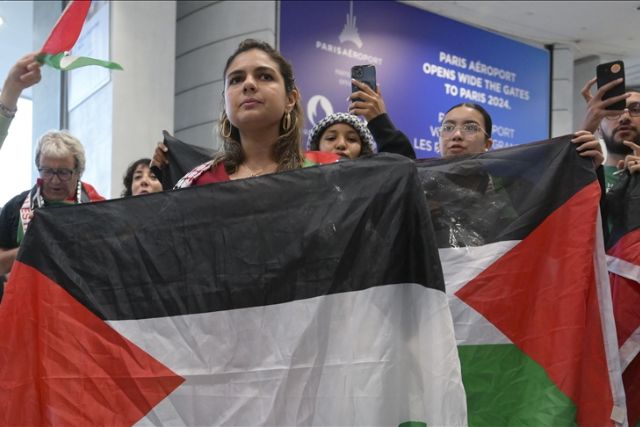FACTBOX - Sporting solidarity: Athletes through Olympic history refuse to take on Israeli opponents
Mounting demands for boycott against Israel at the 2024 Paris Games come in the context of a history of athletes not competing against Israelis to show solidarity with Palestine

- Some, like judokas Fathi Nourine of Algeria or Mohamed Abdalrasool of Sudan, withdrew from Olympic events to avoid facing Israeli opponents, sometimes receiving hefty penalties
- Others were less explicit in their decisions to withdraw, such as Iran's Arash Miresmaeili, who exceeded the weight limit in his category right before a match, later saying: 'I refused to fight my Israeli opponent to sympathize with the suffering of the people of Palestine'
ISTANBUL
With the 2024 Paris Olympics set to begin on Friday, calls for a boycott against Israel are intensifying in response to the country's war in Gaza, which has resulted in the deaths of nearly 40,000 Palestinians since Oct. 7.
Historically, the Olympics have been a platform for political protest, including by athletes of different nationalities refusing to compete against Israeli opponents as a stand against Tel Aviv's policies and its oppression of Palestinians.
In Olympic Games over the past two decades, numerous instances have occurred of athletes withdrawing or deliberately getting disqualified as a means of boycotting Israel in the sporting arena. Here are a few of them:
Athens 2004
Iranian judoka Arash Miresmaeili has been the flag bearer for Iran at the 2004 Summer Olympics in Athens opening ceremony. However, he was disqualified from competing due to being over the permissible weight limit for his class.
Scheduled to fight Israeli judoka Ehud Vaks in the first round, Miresmaili exceeded the 66-kilogram limit by more than two kilos.
It was widely believed that Miresmaili deliberately sought disqualification to avoid competing against an Israeli, as indicated by his comments: "Although I have trained for months and was in good shape, I refused to fight my Israeli opponent to sympathize with the suffering of the people of Palestine, and I do not feel upset at all."
Beijing 2008
Iranian swimmer Mohammad Alirezaei became the first Iranian to qualify for an Olympic swimming event without a wildcard when he secured a spot at the 2008 Summer Olympics in Beijing.
However, he withdrew from the competition minutes before fighting against Israeli swimmer Tom Be'eri.
While team officials cited illness and hospitalization in Beijing as reasons for his withdrawal from the men's 100-meter breaststroke qualifiers, other reports suggested that Alirezaei was instructed by Iranian authorities to withdraw to avoid facing Be'eri.
The Iranian president Mahmoud Ahmadinejad praised Alirezaei's actions, calling them "recorded in the history of Iranian glories."
At the same Olympics, Syrian swimmer Bayan Jumah withdrew from the 50-meter freestyle heat, in which she would have competed against Israeli swimmer Anya Gostomelsky, refusing to swim alongside an Israeli athlete.
London 2012
Iranian judoka Javad Mahjoub made headlines after forfeiting a match against a German opponent at the 2011 Judo World Cup in Tashkent to avoid a potential faceoff with Israeli judoka Or Sasson.
The following year, at the 2012 Olympics, Mahjoub withdrew from the competition after he was told that he might have to face Israeli judoka Arik Zeevi.
Rio 2016
In another instance involving Israel's Sasson, Egyptian judoka Islam El Shehaby refused to shake his hand after their match at the 2016 Rio Olympics.
Sasson defeated El Shehaby in the first round of the over-100-kilogram weight class. When Sasson extended his hand, El Shehaby stepped back and shook his head in refusal.
Saudi Arabian judoka Joud Fahmy forfeited her second-round match in the 2016 Rio Olympics, allowing her to avoid facing Israeli Gili Cohen.
Fahmy said her withdrawal was due to injuries she sustained to her hands and feet during training.
Ahead of the same Games, the entire group of Lebanese athletes refused to share a bus with the Israeli team en route to its opening ceremony.
The incident occurred when the Lebanese team, already on the bus and ready to head to Maracana Stadium, demanded that the Israeli athletes not board.
Despite the insistence of the Israeli athletes to get on the vehicle, the two teams were ultimately transported to the ceremony separately.
Tokyo 2020
Algerian judoka Fathi Nourine withdrew from the 2020 Tokyo Olympics to avoid facing Israeli competitor Tohar Butbul. As a result, the International Judo Federation (IJF) imposed a 10-year ban on both Nourine and his coach.
Similarly, Mohamed Abdalrasool, a Sudanese athlete in the same martial art, withdrew from his scheduled match against Butbul in solidarity with Palestine. Although Abdalrasool had weighed in for his second-round bout, he did not show up to the competition.





